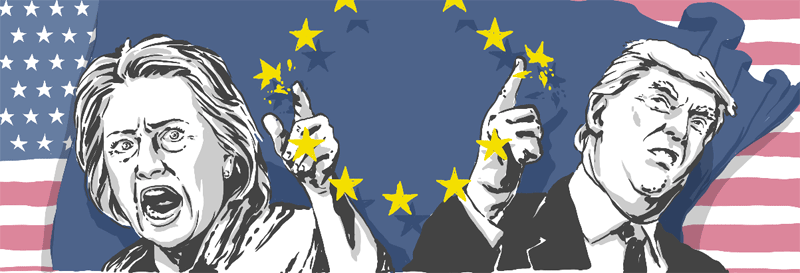
Mark Hallerberg and Mark Kayser react to the third U.S. presidential debate.
“This debate mirrored the first one between the candidates. In the first half hour, it was even, with issues the focus of the discussion. It then shifted to Donald Trump as the centre of attention. Some of this was because Clinton was particularly effective establishing a pattern of his behaviour—for example, she argued that he says through the years whenever he loses that the game is ‘fixed,’ including even at the TV awards ceremony known as the Emmys. He does not know how to apologise or how to take responsibility. She also set him up effectively, with Trump taking the bait to criticise a president lionised by most conservatives, Ronald Reagan. But the news of the night was his refusal to state uncategorically that he will respect the outcome of the election. This comment undid any of the good he did himself earlier in the debate.
Moving forward, he is behind in the polls, and the debate will not move anyone to his side who was not already there. I would generally think the election is over. But this is a strange year. Turnout will be crucial—will Americans the age of our students at Hertie vote, or will they largely stay home, as they did on the Brexit vote in the UK? Will there be a big upswing in non-voters in previous elections coming to the polls, as we have seen in Germany in terms of support for the AfD? There are also global risks that could affect the election—the situation is uncertain in Ukraine. Probably the biggest unknown is whether there will be terrorist attacks, which could bring some voters to Trump’s side. So while Clinton is ahead, it is not over.” – Mark Hallerberg, Professor of Public Management and Political Economy
“This debate was Trump’s last good chance to present himself as presidential and to counter the impression that many voters — most importantly suburban married women in swing states — have of him as volatile, petulant and misogynistic. He failed miserably and raised new concerns about his fitness for office instead. In essence, he did a good job of winning the votes he already has by playing to his base but offered little that would assuage the doubts of more moderate voters. It is almost as if he didn’t get the memo that he needs more than his committed supporters to have a chance of winning. Clinton magnified the contrast by demonstrating composure and preparation. Debates, let alone third debates, rarely have a big effect on a presidential elections but Trump’s calamitous refusal to commit to accepting the results of the election if he loses will live on in political memory and feed concerns that he is a threat to American democracy.” – Mark Kayser, Professor of Applied Methods and Comparative Politics
More about the authors
-
Mark Hallerberg, Professor of Public Management and Political Economy
-
Mark Kayser, Professor of Applied Methods and Comparative Politics
